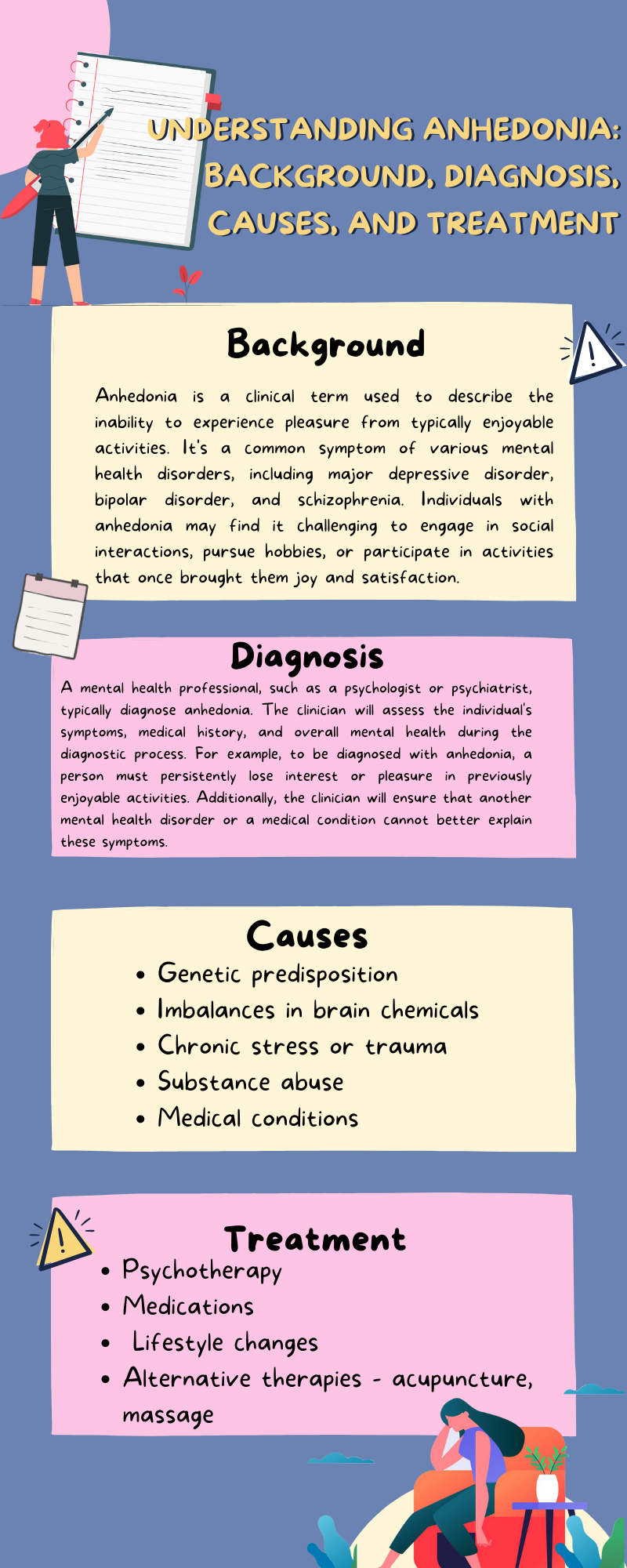An Introduction to Anhedonia and Depression
It’s common for people to experience a lack of motivation or pleasure in their lives. However, when this feeling persists and affects your overall well-being, it could be a sign of a deeper issue. This blog post will explore the connection between anhedonia and depression, examining their similarities, differences, and potential treatment options.
Table of Contents
Anhedonia Infographic: Exploring Background, Diagnosis, Causes, and Symptoms
Discover the essential aspects of anhedonia with our comprehensive infographic, which delves into the background, diagnosis, causes, and symptoms of this complex mental health condition.

Understanding Anhedonia
Before we delve deeper into the connection between anhedonia and depression, it’s essential to have a clear understanding of the anhedonia itself. Therefore, this section will define anhedonia, explore its causes, and discuss its common symptoms.
Definition of Anhedonia
Anhedonia is a clinical term that describes the inability to experience pleasure from typically enjoyable activities. It’s a common symptom of various mental health disorders, including depression, and can significantly impact an individual’s quality of life.
Causes of Anhedonia
The exact cause of anhedonia remains unclear, but it’s believed to be linked to several factors, including:
- Genetic predisposition
- Imbalances in brain chemicals, such as dopamine
- Chronic stress or trauma
- Substance abuse
- Medical conditions like Parkinson’s disease
Symptoms of Anhedonia
Some common signs and symptoms of anhedonia include:
- Loss of interest in previously enjoyable activities
- Social withdrawal
- Lack of motivation
- Persistent sadness or feelings of emptiness
- Difficulty experiencing or expressing emotions
Anhedonia Diagnosis
Diagnosing anhedonia often involves a comprehensive evaluation by a mental health professional.
Clinical Interview: The mental health professional will conduct a thorough interview to assess the individual’s symptoms, medical history, and other relevant factors. This interview helps the professional better understand the person’s experiences and emotions related to anhedonia.
Psychological Evaluation: The mental health professional may use standardized questionnaires or assessments to gauge the severity of anhedonia and its impact on the individual’s daily life. These tools can help identify any underlying mental health conditions contributing to the anhedonia symptoms.
Rule out Physical Causes: A physical examination and laboratory tests may be conducted to rule out any medical conditions that could cause symptoms similar to anhedonia, such as thyroid disorders or vitamin deficiencies.
Differential Diagnosis: The mental health professional will consider whether another mental health disorder or a medical condition could better explain the anhedonia symptoms. This is essential in ensuring the most accurate diagnosis and appropriate treatment plan.
Once a thorough evaluation is completed, the mental health professional will determine if the individual meets the anhedonia criteria and provide treatment options and recommendations.
Understanding Depression
Before examining the relationship between anhedonia and depression, it’s crucial to gain a comprehensive understanding of depression as a mental health condition. This section will define depression, delve into its potential causes, and outline its prevalent symptoms.
Definition of Depression
Depression, often called a major depressive disorder, is a common mental health issue manifesting ongoing sadness, hopelessness, and a loss of interest or pleasure in activities. This debilitating condition influences a person’s thoughts, emotions, and overall well-being, resulting in various emotional and physical problems.
Causes of Depression
The exact cause of depression remains complex and multifaceted, with various factors contributing to its development, including:
- Genetic predisposition
- Neurotransmitter imbalances, such as serotonin and norepinephrine
- Chronic stress or exposure to traumatic events
- Substance abuse or addiction
- Underlying medical conditions, such as thyroid disorders or hormonal imbalances
- Environmental factors, including social isolation, loss, or significant life changes
Symptoms of Depression
Some common signs and symptoms of depression include:
- Persistent sadness, hopelessness, or feelings of emptiness
- Loss of interest or pleasure in previously enjoyed activities
- Fluctuations in appetite or weight
- Sleep disturbances, including insomnia or hypersomnia
- Fatigue or a lack of energy
- Difficulty concentrating, making decisions, or remembering details
- Feelings of worthlessness, excessive guilt, or self-blame
- Irritability, agitation, or restlessness
- Physical symptoms, such as headaches, muscle pain, or digestive issues
- Thoughts of death, self-harm, or suicide
The Link Between Anhedonia and Depression
The intricate link between anhedonia and depression stems from various shared factors contributing to their development. In this section, we’ll delve into the biological aspects connecting these conditions, the role dopamine plays, and how anhedonia can potentially lead to depression.
Shared Biological Factors
Anhedonia and depression share several biological factors, such as imbalances in neurotransmitters like serotonin and dopamine. These chemical messengers play a vital role in regulating mood and motivation, and their disruption can contribute to both conditions.
The Role of Dopamine
Dopamine, a neurotransmitter linked to the brain’s reward system, is thought to impact the development of anhedonia significantly. Furthermore, individuals with depression have been found to exhibit lower dopamine levels, hinting at a potential connection between these two conditions.
How Anhedonia Contributes to Depression
Anhedonia can intensify depression by depriving individuals of the pleasure and motivation necessary for participating in activities that boost their mood. Consequently, they may become increasingly socially isolated and experience a worsening of their depressive symptoms.
Treatment Options for Anhedonia and Depression
It is essential to find the proper treatment for anhedonia and depression to overcome obstacles and enhance mental well-being. This section will explore a range of treatment options, such as psychotherapy, medications, lifestyle adjustments, and alternative therapies, to assist individuals in identifying the best approach tailored to their unique circumstances.
Psychotherapy
Effective in treating both anhedonia and depression, psychotherapy methods like cognitive-behavioral therapy (CBT) and interpersonal therapy (IPT) aid individuals in pinpointing negative thought patterns, developing healthier coping strategies, and improving interpersonal relationships.
Medications
Antidepressant medications, particularly selective serotonin reuptake inhibitors (SSRIs) and serotonin-norepinephrine reuptake inhibitors (SNRIs), can help regulate neurotransmitter imbalances and alleviate symptoms of anhedonia and depression. However, working closely with a healthcare professional to find the most suitable medication and dosage is essential.
Lifestyle Changes
Adopting positive lifestyle changes can greatly influence mental health. Engaging in regular exercise, maintaining a balanced diet, ensuring sufficient sleep, and practicing stress management techniques can potentially enhance mood and alleviate symptoms of both anhedonia and depression.
Alternative Therapies
Alternative therapies, such as acupuncture, massage, and meditation, can also be beneficial in managing symptoms of anhedonia and depression. These treatments help restore balance in the body and promote overall well-being.
Conclusion
The intricate connection between anhedonia and depression involves shared biological factors and symptoms that can intensify each other. Grasping this link is essential for pinpointing suitable treatments and approaches to enhance mental health. By seeking professional help, exploring various treatment options, and making healthy lifestyle changes, individuals can overcome the challenges of anhedonia and depression and enjoy a more fulfilling life.
FAQs
What is anhedonia?
Anhedonia is a clinical term that describes the inability to experience pleasure from typically enjoyable activities. It’s a common symptom of various mental health disorders, including depression.
How are anhedonia and depression connected?
Anhedonia and depression share several biological factors, such as imbalances in neurotransmitters like serotonin and dopamine. Anhedonia can also exacerbate depression by depriving individuals of the pleasure and motivation to engage in mood-improving activities.
Can anhedonia be treated?
Anhedonia can be treated using various approaches, including psychotherapy, medications, lifestyle changes, and alternative therapies. Working with a healthcare professional to develop an individualized treatment plan is essential.
What lifestyle changes can help improve anhedonia and depression?
Regular exercise, a balanced diet, adequate sleep, and stress management techniques may help improve mood and reduce symptoms of anhedonia and depression.
Are there alternative therapies that can help with anhedonia and depression?
Yes, alternative therapies like acupuncture, massage, and meditation can be beneficial in managing symptoms of anhedonia and depression. These treatments help restore balance in the body and promote overall well-being.
Please always consult with a mental health professional if you have concerns about your mental health.
A Word From Psyev
At Psyev, we’re dedicated to supporting our readers as they navigate the challenges of depression and anhedonia. We encourage those who suspect they or a loved one may be experiencing related symptoms to seek professional help from a mental health expert. Implementing self-care strategies and building a solid support network can significantly improve mental health and overall well-being.
Remember, you are not alone, and help is available. Prioritizing your mental health and seeking support shows strength and self-compassion. Together, we can work towards a brighter, healthier future.
If you believe you are experiencing anhedonia, know someone who might be, or wants to determine if you have anhedonia, consider taking this anhedonia test. It’s a helpful resource for gaining insight into your emotional well-being. In addition, it can be an essential step in seeking appropriate support and treatment.
If you have any further questions or need assistance, please feel free to ask in the comments below or join the forum.
